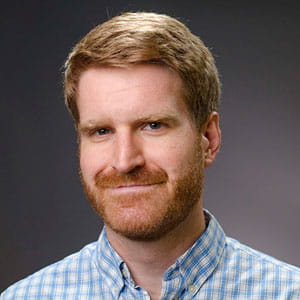Employee Spotlight: Richard Kopp, Champion of the Drexel Fight Song

Richard Kopp has sung Drexel’s fight song behind a table at new student orientation sessions. He has sung it with fist-pumping fury in front of 3,000 new students in the Daskalakis Athletic Center. And he has sung it in a boardroom, in front of 50 or so skeptical Alumni Association Board of Governors members.
In fact, it’s Kopp’s job to be a “champion” of the fight song and other Drexel traditions. When his position was created two years ago, he made sure of it.
Kopp, who has worked at Drexel since 2007, is director of student leadership development and traditions in Student Affairs. The “traditions” part came at his request, after reviving, protecting and promoting Drexel traditions — some of them long-lost — became a personal mission for him.
Much of his job involves overseeing a range of leadership programs for students, including CEO LEAD, Drexel Senior Experience and the just-launched Leadership Academy. But he spends the rest of his time trying to instill a sense of tradition and history at Drexel that, at one point, had largely faded away.
“Drexel was unlike many institutions, in that there was not a lot of campus pride and spirit inherently,” Kopp said. “A lot of that stuff is usually tied to football programs, and we don’t have one here.”
He became aware of those faded traditions about six years ago when he joined the Drexel Spirit Committee, a group tasked with promoting spirit on campus. Back then, he worked for the Office of Alumni Relations as an alumni-student connector. He and the rest of the committee noticed that some typical college-campus traditions weren’t really present at Drexel. There was no fight song or homecoming to be found.
Researching with the help of University Archivist Rob Sieczkiewicz, they found that some of those traditions faded after Drexel disbanded its football program in 1973. The University’s financial troubles in the 1980s and early ‘90s didn’t help to make for a spirited campus, either.
“Spirit and pride were way down,” Kopp said. “There weren’t a lot of traditions keeping the glue together.”
So the group went to work resurrecting some of those traditions, starting with a fight song. They discovered that there was such a song, titled simply “Drexel Fight Song,” written in 1938 by two students. They dug up the original sheet music and made a few lyrical revisions to update it to 21st-century standards (a call for the “boys” to charge down the field was removed, to reflect the gender equity present in the University’s athletics programs now).
Spurred by the committee, the pep band began playing the song again, this time at men’s and women’s basketball games instead of football contests. Every year, Kopp teaches Drexel’s roughly 3,000 incoming freshmen the song at their induction ceremony. Now, every class of students currently at Drexel has been taught the song.
In 2009, the Spirit Committee helped resurrect Drexel’s homecoming as well, complete with reunions, social gatherings and a king and queen. After about two years, the committee dissolved. But Kopp asked to build the promotion of traditions into his new job title, and he’s served as their guardian since.
“Drexel needs champions of these traditions, to make sure its rich history and legends don’t die,” Kopp said.
Now he presents about Drexel traditions at orientation sessions, trains students upon their arrival and does whatever he can to keep those traditions in place. To celebrate the fight song’s 75th anniversary this 2013-14 academic year, he’s organizing a contest this spring asking students, alumni, faculty and staff to submit videos of themselves singing the song, wherever they are, whether that’s in a Drexel residence hall or in China.
His hope is to culminate the contest with an event where participants could attempt to break the world record for the most people who sing a song — and this is not a joke — while popping bubble wrap. (It’s kind of a joke.)
“It’s supposed to be fun,” Kopp said, “and we want people to just feel connected to the University.”
That’s what all this work is about. A university where people can share common bonds like tradition is one where people can enjoy learning, teaching or working, he said.
“I think it’s almost an expectation when you come to a college or a university that you’re coming for an experience, that you want to be a part of a family and culture that lives outside the classroom,” Kopp said. “If you don’t have the traditions that go along with that, it can feel stale and stagnant, and it can also be a reason that people might not want to stay.”
To learn more about Drexel’s traditions, visit drexel.edu/traditions.
Drexel News is produced by
University Marketing and Communications.

